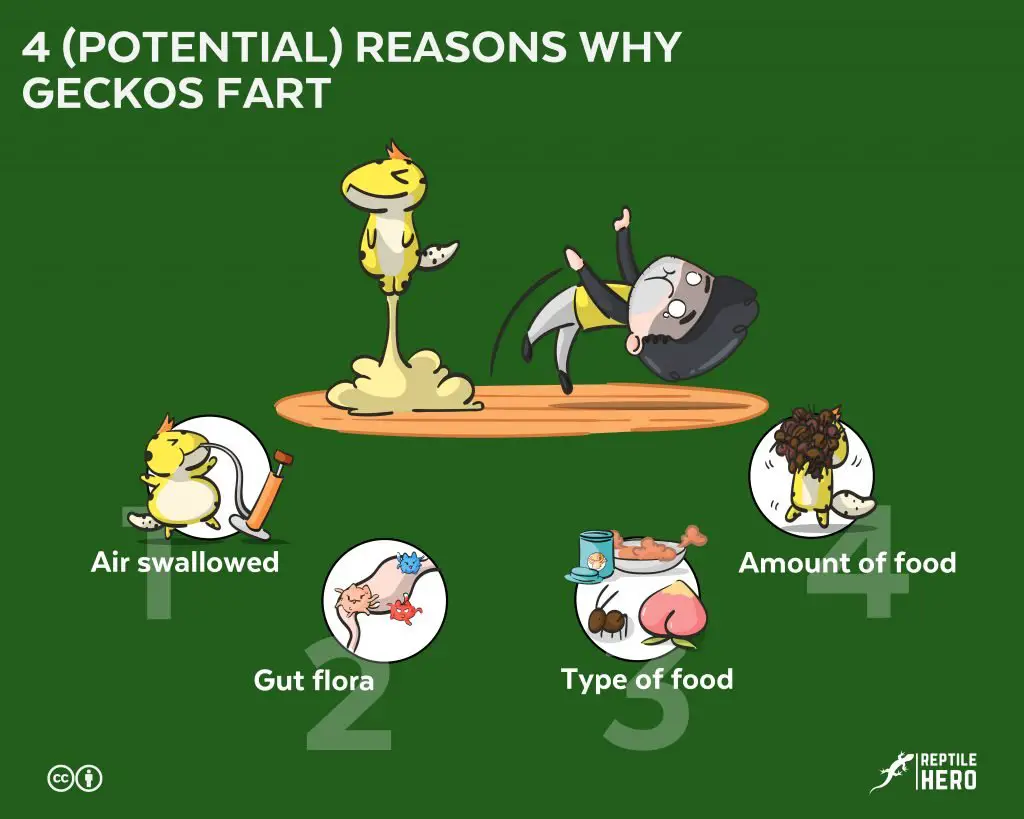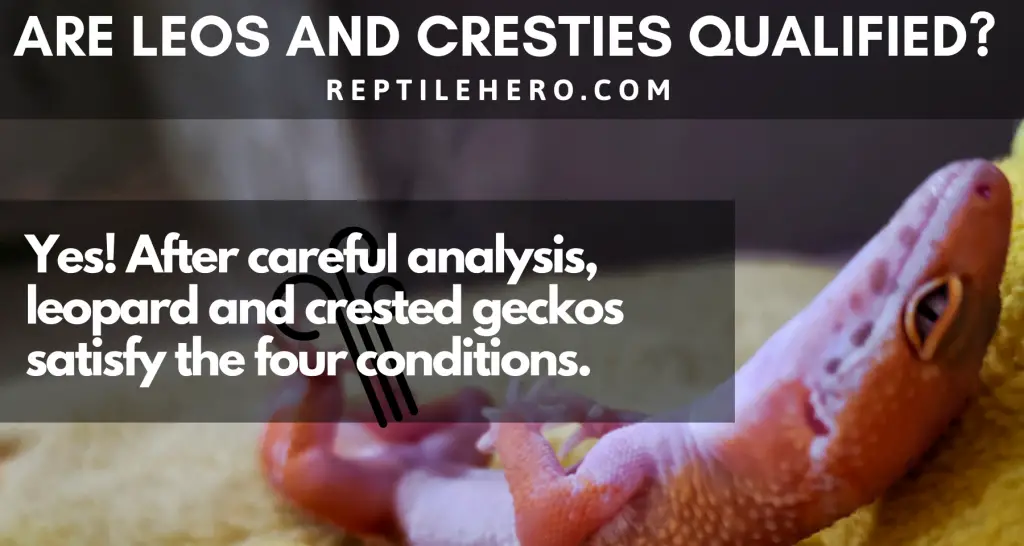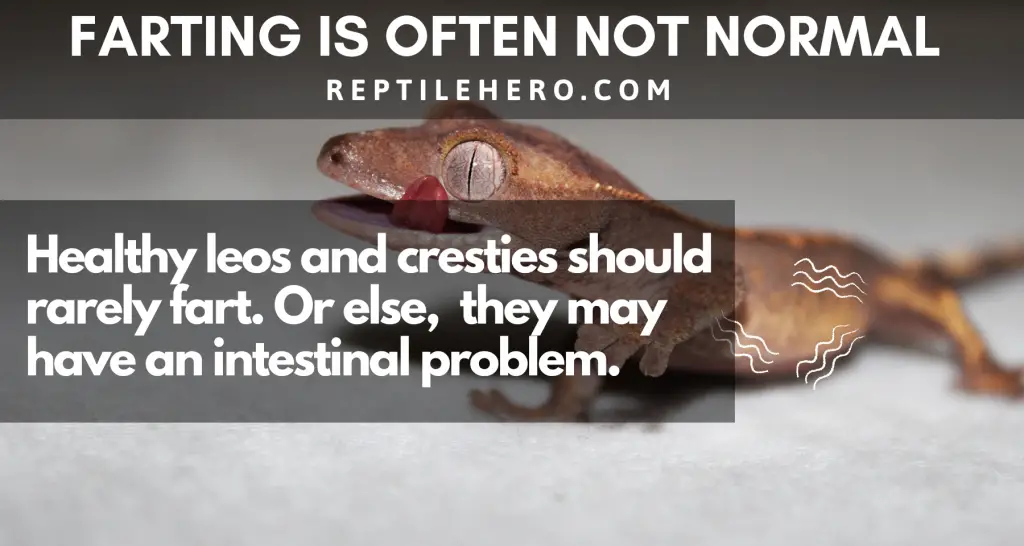Do Geckos Fart? [4 Potential Reasons]
Being a hands-on owner of a leopard or crested gecko allows you to monitor its typical and unusual behavior, such as jumping, licking, or sneezing. But have you ever witnessed your reptile randomly pass a gas? Did you, by any chance, wonder if it even can?
Healthy leopard and crested geckos can fart. It is described as a faint buzzing sound of a zipper with a distinctly unpleasant smell. On sick geckos, it is often caused by an intestinal problem. So, owners must observe for other accompanying signs for proper diagnosis.
If you are also curious like us, let us dive into it!
But wait! Did you know?
The word ‘fart’ has actually a long history that goes back beyond the 14th century. People in the medieval period coined this word to particularly define the moment of gas loudly escaping from the body.
The 4 (Potential) Reasons Why Geckos Fart
Despite farting in leopard and crested geckos, it is a grossly unexplored topic with no scientific evidence that we can at least explore. However, we can analyze their situation by comparing them to larger animals (including humans) and to the reasons why they fart.

The four scientific reasons why many animals do fart are:
- Air swallowed: the amount of air ingested by chewing and eating is proven to increase the frequency of farting;
- Gut flora: the microbes in many animal digestive systems help to break down the food eaten. In the process, gases (the fart) are produced and released. In many animals depending on the concentration and type of bacteria, the farting can be more or less often;
- Type of food: in large animal, it is very well known that some food (some fruits and legumes) trigger more frequent farting;
- Amount of food: in case of a high eating frequency and a large amount of food, the gases produced by the digestive system do not have the time for partial reabsorption to the bloodstream. As a result, they end up directly as a fart.

Leopard and crested geckos experience similar conditions to larger animals that might explain why and how they fart.
Even up to this writing, there is an absence of comprehensive studies. Regardless, we can always make a conjecture—an intelligent guess—out of the related and reliable analysis. So, we can search for some clues in their digestive system, starting off with the five deciding factors.
1. The Amount of Air Swallowed
What do we know?
As we can observe, leopard and crested geckos do chew their food, just like us, but at a slower pace.
What can we assume?
Knowing that they chew, leopard and crested geckos could swallow gases as well. But with the slower pace, there are chances that less gas can accompany the food when ingested.
2. The Presence of Gut Flora
What do we know?
Carnivorous and omnivorous lizards like leopard and crested geckos do contain a gut microbiota. But due to their more uncomplicated intestinal tract, the concentration is not as abundant as herbivorous ones like iguanas [2].
What can we assume? With a thriving community of gut microbes, leopard and crested geckos can accumulate an adequate amount of gases in their intestines. This can cause intestinal pressure to increase.
3. The Type of Food Eaten
What do we know?
Leopard geckos are strictly on a live-insect diet. But their gut-loaded insects are omnivores. On the other hand, crested geckos are on a premixed-powder diet. But they can occasionally feed on fresh fruit smoothie treats.
What can we assume?
The fact that they eat just like us can mean two things: 1) once they swallow the food, they may swallow air, and 2) their gut flora has something to process, which may create gases along the way.
4. The Amount of Food
What do we know?
Although the frequency of eating (and therefore, pooping) varies as they age, leopard and crested geckos do eat but not just as often as we do [3][4].
What can we assume?
On healthy leopard and crested geckos, their digestion rate can be just enough for gases to build up in the intestines
Fun Fact!
Leopard and crested gecko fart sound like a zipper. But why?
What do we know?
Just like crocodiles, it is known that geckos—both leopard and crested—do possess cloacal sphincter muscles that regulate the contraction and relaxation of their opening [5].
What can we assume?
The presence of muscle regulation in the vent of both leopard and crested geckos can hint that passing gases—both swallowed from the mouth and produced in the intestines—may get audible.

What Do Gecko Owners Say?
Anecdotal accounts from many gecko owners confirm the assumption that both leopard and crested geckos expel gases occasionally.
Due to their popularity as exotic pets, leopard and crested geckos have more chances of being observed from different points of view. In fact, I have heard and read from my friends and many gecko owners online that attest to the mysterious farting behavior in geckos. And you could never miss its sound and smell.
The Sound
A gecko’s faint buzzing fart can be in a quiet room, similar to zipping zippers. With little means to communicate with each other, it is crucial to know which is responsible for which to better understand your gecko and its needs.
That being said, you could expect to pick up a faint sound when your gecko farts. Especially when the room is quiet, the sound could be similar to an audible buzzing or some sort of a zipper that is rapidly opened and closed.
The Smell
The awful and noticeable odor of a gecko’s fart is affected by its diet. Once your gecko farts, you may not always hear the subtle sound. But what you can most likely catch is its distinct smell that follows. And it varies according to your gecko’s diet.
If you have a leopard gecko, you can expect what the insects and other bugs would smell in gaseous form (which is noxious, by the way). On the other hand, you can anticipate a crested gecko’s fart to smell just like the premixed powder meals. And depending on the flavor, it may be dull or stinky.
Nonetheless, the smell probably is not too pleasant for you to take in. And even though what initially catches your attention is the weird sound, what can confirm your instinct is the smell that follows.
As often as not, all owners I have talked to have shared that their geckos excrete recognizable and malodorous fart preceding defecation. But whether the sound and smell come from the fart or feces is challenging to judge. So, this would call for further studies to verify their anecdotes.
Why Would Your Gecko Fart More Than Usual?
All farts are not generated equally due to several factors that come into play. While farting in geckos can be expected, the frequency of a typical fart is affected by significant variations of the five deciding factors.
1. The amount of air swallowed. It is possible that this factor can affect the overall volume of gases in a fart. But one thing I have heard (which could be related in some ways) is that male geckos do fart more frequently.
The reason being, they close their mouths more often than the females, which could build enough pressure for gases to go down and escape on the opposite end. But you must take this statement with a grain of salt since studies need to confirm this hypothesis.
2. The presence of gut flora. This factor could have the heaviest influence on a fart’s volume and frequency. And some healthy geckos could just have a higher concentration of intestinal microbes for no apparent reason or due to external factors like changes in temperature [6]. In turn, they would produce more gas during the process, which is released in one blow or in many more minor winds.
3. The type of food eaten. Another factor that could heavily alter the volume and frequency of a fart is the type of food eaten. While food affects each gecko differently, studies have shown that foods rich in carbohydrates can be difficult to digest. And when they reach the intestine, they are further broken down by the many gut flora, making your gecko gassier.
4. The amount of food. Some geckos could just have a faster or slower digestion rate than others relative to the amount of food eaten. And when your gecko’s digestion is quite fast, there could be little time for gas to pile up in the intestines, so they fart less (and vice versa).
What Could It Mean When Geckos Fart?
Farting in healthy geckos can be normal when it seldom happens. Otherwise, it could most likely indicate underlying health problems that must be tended to.
After careful analysis of the five deciding factors, it is believable that geckos can fart just like any other animals that meet the criteria. And the frequency of the act is mainly affected by changes in any of the factors. However, it turns out that you must be on alert for other signs when your gecko farts as much as you can notice.
The Main Concern: Intestinal Problem
When your gecko is in tiptop condition, it should actually not fart too much since it could actually mean another matter.
In healthy reptiles, including leopard and crested geckos, generating too much gastrointestinal gas is not normal. Whereby producing more than the usual gas could indicate an intestinal problem [7].
While there could be other causes, an intestinal problem in geckos could be due to:
- bacteria
- viruses
- fungi
- protozoans
- parasites
- obstructions
- poor husbandry
- tumors
Care varies with the cause of the intestinal problem in your gecko. Here at Reptile Hero, we do not tolerate self-medicating your pet. So, you should always pay your veterinarian a visit for professional assessment and treatment.

Farting in Other Lizards
Unfortunately, video clips of a leopard or crested gecko farting are hard to come by. But if you are wondering how it could happen on your gecko, check out this clip of a massive fart from an iguana that is taking a bath.
Takeaways
While a fart has a strict medical definition, its colloquial meaning has a broader scope to accommodate other similar actions even if it no longer becomes medically correct.
There can be several deciding factors that must be satisfied for a fart to occur. But four of these are: 1) the amount of air swallowed, 2) the presence of gut flora, 3) the type of food eaten, and 4) the amount of food.
After careful analysis and evaluation of the five chosen deciding factors, both leopard and crested geckos are eligible to fart.
Anecdotal stories confirm the occurrence of farting in leopard and crested geckos. Some even describe the sound to be faint and its smell to be distinctly malodorous.
Despite a fart being harmless to an extent, leopard and crested geckos should be observed for other emerging signs as it could indicate an intestinal problem.
Sources
[1] https://www.rte.ie/brainstorm/2019/0624/1057251-the-science-of-farting/#maincontent
[2] https://veteriankey.com/basic-reptile-and-amphibian-anatomy-and-physiology/
[3] https://www.exoticdirect.co.uk/news/what-should-leopard-geckos-eat-food-and-dietary-requirements
[4] https://www.exoticdirect.co.uk/news/crested-gecko-diet-what-to-feed-your-crested-gecko
[5] https://www.nature.com/articles/s41598-017-09359-y


![The 5 Reasons Why Do Your Geckos Jump [and 5 Precautions]](https://www.reptilehero.com/wp-content/uploads/2022/01/why-geckos-jump-cc-768x614.jpg)
![7 Reasons Why Gecko Feet Are Not Sticky [and 2 Solutions]](https://www.reptilehero.com/wp-content/uploads/2021/03/G37-768x614.jpg)

![8 Reasons Why Your Gecko Lays Infertile Eggs [and 5 Tips]](https://www.reptilehero.com/wp-content/uploads/2021/02/G36-768x614.jpg)
![Do Leopard Geckos Like Blankets? [Best Fabrics]](https://www.reptilehero.com/wp-content/uploads/2021/05/word-image-768x576.png)